Table of Contents |
guest 2025-12-23 |
Registration
S1 - Introduction to Skyline
S2 - Advanced Small Molecule Topics
S3 - Introduction to Skyline
S4 - Advanced Proteomics Topics
All course schedules
Instructor List
The following instructors and speakers have agreed to contribute their expertise to the success of October 2022 Skyline Online Course:
 |
Brendan MacLean Brendan worked at Microsoft for 8 years in the 1990s where he was a lead developer and development manager for the Visual C++/Developer Studio Project. Since leaving Microsoft, Brendan has been the Vice President of Engineering for Westside Corporation, Director of Engineering for BEA Systems, Inc., Sr. Software Engineer at the Fred Hutchinson Cancer Research Center, and a founding partner of LabKey Software. In this last position he was one of the key programmers responsible for the Computational Proteomics Analysis System (CPAS), made significant contributions to the development of X!Tandem and the Trans Proteomic Pipeline, and created the LabKey Enterprise Pipeline. Since August, 2008 he has worked as a Sr. Software Engineer within the MacCoss lab and been responsible for all aspects of design, development and support in creating the Skyline Targeted Proteomics Environment and its growing worldwide user community. |
|
 |
Chris Ashwood Ph.D. |
|
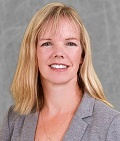 |
Erin Baker Ph.D.
|
|
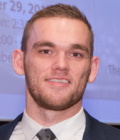 |
Natan Basisty, Ph.D. Nate is a postdoctoral fellow in Dr. Birgit Schilling’s lab in the Buck Institute for Research on Aging in California. He received his Ph.D. from the University of Washington, advised by Drs. Peter Rabinovitch and Michael MacCoss Dr. Basisty develops novel and specialized proteomic approaches to understand aging processes and age-related diseases, including the application of data-independent acquisition (DIA) or SWATH workflows to identify and quantify PTMs and secretomes, development of pipelines to comprehensively assess protein turnover rates, and cell-surface proteomics (surfaceomics). A major aim of his current work is to discover biomarkers of cellular senescence and develop translationally relevant approaches to study senescent cells in humans, enabled by the application of proteomics. Dr. Basisty has been recognized for his work investigating the role of protein turnover in mammalian aging and longevity using a combination of metabolic labeling, LC-MS/MS, and software tools. |
|
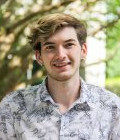 |
Michael Davern Michael is a graduate Ph.D. student in Dr. Jason Surratt’s lab at the University of North Carolina at Chapel Hill. He received his Bachelor's in Chemistry from Wake Forest University. Currently, his research focuses on developing analytical methods for quantitative outdoor atmospheric Per- and Polyfluoroaklyl substance (PFAS) analysis, employing the use of Chemical Ionization Mass Spectrometry. (CIMS) His goal is to achieve lower detection limits and establish real-time methods for atmospheric measurements. |
|
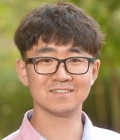 |
Weixian Deng Weixian is a Ph.D. graduate student at UCLA under the supervision of Drs. James Wohlschlegel and Kathrin Plath. He obtained his bachelor and master degrees from Jilin University in China, where he studied using targeted mass spectrometry for quantifying plant protein post translational modifications. In his Ph.D. research, he optimized a series of affinity purification-MS techniques and applied DIA method trying to i) quantify the interactome change of Yamanaka factors in induced pluripotent stem cells (iPSC) reprogramming and ii) to characterize long non-coding RNA (lncRNA) Xist's interactome in early embryo development. His goal is to improve the LC-MS based proteomics to gain better understanding in protein-involved gene regulation molecular events which are usually of low abundance in vivo. |
|
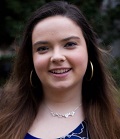 |
Lilian Heil Lilian is a PhD student in Genome Sciences interested in developing methods for the acquisition and analysis of quantitative proteomics data. She joined the department in the fall of 2019 after graduating from the University of North Carolina in the winter of 2018 with a B.S. in Chemistry. Before graduate school, she worked in the Hicks Lab at UNC for 2 years as an undergraduate trainee and for several months as a full time research assistant using mass spectrometry to identify and characterize novel bioactive peptides. There, she helped to discover and sequence a novel antimicrobial peptide from Amaranthus tricolor and developed a passion for mass spectrometry. |
|
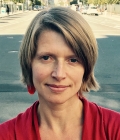 |
Ruth Huttenhain, Ph.D. Ruth Huttenhain is an incoming Assistant professor in the Molecular and Cellular Physiology Department at Stanford, which she will start her lab in Spring 2023. Currently, she holds an appointment as Assistant Adjunct Professor at the University of California San Francisco (UCSF) in the Department of Cellular and Molecular Pharmacology. She obtained a Pharmacy degree from the University of Bonn and a PhD from ETH Zurich, Switzerland, where she developed high-throughput, large scale targeted mass spectrometric approaches. During her postdoc at UCSF, Ruth extended her expertise in quantitative mass spectrometry to study dynamics of protein interaction networks. She pioneered a proximity labeling-mass spectrometry approach that simultaneously captures the precise temporal remodeling and spatial organization of proximal protein networks. The research of Ruth’s group at UCSF focuses on characterizing protein interaction and signaling networks to understand the biology underlying the development of psychiatric disorders and the sensing and transmission of pain. Ruth is the Co-Chair of the Early Career Researcher Initiative of the Human Proteome Organization (HUPO ECR). |
|
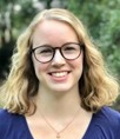 |
Kaylie Kirkwood Kaylie is a second-year graduate student at North Carolina State University working under the advisement of Dr. Erin Baker. Thus far, her research has focused on the development of lipid LC-IMS-MS libraries in Skyline and the application of these libraries to various clinical and environmental applications. Skyline was the first software Kaylie learned to use as an undergraduate researcher for small molecule detection including cyanotoxins, amino acids, and metabolomics profiling of amyotrophic lateral with Dr. David Muddiman. Its adaptability and interactive developers have allowed her to continue utilizing it in her current research. |
|
 |
Lindsay K. Pino, Ph.D. Lindsay is a postdoctoral researcher in Dr. Ben Garcia’s lab at the University of Pennsylvania where she uses quantitative mass spectrometry to study epigenetics. Before going to the University of Washington for graduate school, she spent two years in South Korea as a Fulbright scholar and three years working as a research associate in Dr. Steve Carr's Proteomics Platform at the Broad Institute of MIT and Harvard. She earned her PhD under the joint advisorship of Drs. Michael J. MacCoss and William Stafford Noble. There, she developed techniques for data independent acquisition mass spectrometry, in particular the challenges associated with scaling up quantitative mass spectrometry experiments. Her research interests are in the roles proteins play in nuclear organization and the maintenance of genomic stability. |
|
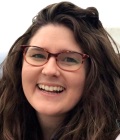 |
Deanna Plubell Deanna is a Ph.D. student in the MacCoss lab at the University of Washington. A portion of her research has been the use of data-independent acquisition to aid in peptide selection for targeted assay development. Her other research interests include the use of mass spectrometry techniques for detecting proteolytic cleavage activity and small endogenous polypeptides in neurodegenerative disease. Prior to joining the MacCoss lab, Deanna worked at Oregon Health & Science University where she used both discovery and targeted proteomics methods to investigate changes to adipose tissue and lipoprotein proteomes in cardiovascular and metabolic diseases. |
|
 |
Nick Riley, Ph.D. Nick is a postdoctoral researcher in Prof. Carolyn Bertozzi’s lab at Stanford University, where he is developing glycoproteomics tools to understand how cancer cells alter their cell surface glycoproteome to promote metastasis. Before Stanford, Nick earned his Ph.D. with Prof. Josh Coon at the University of Wisconsin-Madison. There he worked on mass spectrometry instrumentation and methodology to improve the characterization of both peptides and intact proteins. Most of his efforts focused on implementing activated ion electron transfer dissociation (AI-ETD) to improve sequencing information obtained from ETD MS/MS spectra, which ultimately led him to the intriguing world of glycobiology that he now studies in the Bertozzi group. |
|
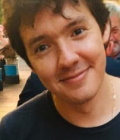 |
Juan Rojas Juan is a third-year Ph.D. student at Universität Leipzig under the tutelage of Prof. Dr. Ralf Hoffmann where he uses LC-IMS-MS to identify and quantify low abundance carbonylation PTMs in human plasma in search of potential biomarkers towards oxidative distress related diseases such as rheumatoid arthritis. During his study, comprehensive platforms, such as Skyline, that can integrate LC-IMS-MS and peptide identifications from multiple search engines have become indispensable for the progress of carbonylation PTMs. Prior to his stay in Leipzig (Germany), this Panamanian-born nomad obtained a BSc in Biochemistry at Florida State University (USA), worked as a mass spectrometry technician at INDICASAT-AIP (Panama), and obtained a MSc in Molecular Analytical Science at The University of Warwick (UK). |
|
 |
Roman Sakson works as a research associate at the Leibniz Institute for Analytical Sciences, ISAS, in Dortmund (Germany). He joined the Proteomics group headed by Prof. Albert Sickmann end of 2020. Before that, Roman worked for five years as a master as well as Ph.D. student at the Core Facility for MS and Proteomics at Heidelberg University. In 2015 Roman started working with Skyline and later Panorama for targeted assay development, data visualization and quality control. He enjoys teaching a lot and has offered Skyline courses to colleagues and fellow students on numerous occasions. Roman’s main current research interest is robust and accurate targeted proteomics for clinical applications. | |
| Pawel Sadowski Ph.D. completed his Ph.D. in the field of quantitative proteomics at the University of Cambridge. During subsequent post-doctoral appointments at the New York University and at the University of New South Wales in Sydney he applied label-free and label-based approaches to study biomarkers, protein-protein interactions and PTMs. In 2013 Pawel joined Queensland University of Technology in Brisbane to lead Proteomics and Small Molecule Mass Spectrometry Core in the QUT Central Analytical Research Facility. He supervises research that utilizes LCMS and GCMS instrumentation. Pawel’s interest lays in leveraging the power of recent advancements in data acquisition strategies for MS-based proteomics to drive clinical veterinary research into the next generation. More recently, he has started using quantitative mass spectrometry to study metabolites and other small molecules. | ||
 |
Stoyan Stoychev, Ph.D. Stoyan currently holds a joint position as a senior researcher at the CSIR Molecular Diagnostics & Omics group (Pretoria, South Africa) as well as Head of Proteomics at ReSyn Biosciences. He started his career in 2008 as a post-doctoral researcher with the task of establishing mass spectrometry analytical facility after completing a Ph.D. in Structural Biology. Currently the main focus of this unit is the application of high-throughput DIA workflows in the space of clinical proteomics. The facility is part of the Diplomics network of academic, commercial and industrial labs supporting Oimcs research in South Africa. At ReSyn Stoyan is involved in the development of technology, products and wokflows focussed on bioseparation and mass spectrometry sample preparation. Stoyan has won numerous awards including two Technical excellence as well as a Team Impact award. |
Registration

Dear Skyline Users,
Note: all sessions now full. Check the events page for future events.
The Skyline Team and our invited instructors are pleased to announce a fourth offering of the wildly popular Skyline Online course coming this October, 10 - 21, 2022. Even with 50 openings per session, last year's sessions filled up in the first week. Do not put off registering if you want to attend.
We will do our best to deliver again what the community has come to expect -- great instruction, engaging lectures, hands-on tutorials and plenty of student/teacher interaction and support.
Skyline Online will offer four sessions covering these proteomics and small molecule topics:
- Currently FULL Session 1 - Introduction to Skyline - Oct 10-11 (Same as Session 3)
- Currently FULL Session 2 - Advanced Small Molecule Topics - Oct 13-14
- Currently FULL Session 3 - Introduction to Skyline - Oct 17-18 (Same as Session 1)
- Currently FULL Session 4 - Advanced Proteomics Topics - Oct 20-21 (click through to join waitlist)
NOTE: as noted above, all sessions are full. To join the waitlist, please complete this form and click the "Join Waitlist" button below and your submission to the waitlist will be complete. Please do not try to pay for the course. We will contact you if seats become available.
The session schedules will address a range of targeted techniques using SRM, PRM, DIA and MS1 filtering, and topics like system suitability, gas chromatography analysis and a whole section dedicated to advanced small molecule analysis and data processing. All sessions aim to help you learn to use Skyline software more effectively in your research. Sessions will consist of a mix of live lectures, taped content, self-paced tutorials and hands-on practicals, with instructors available for questions.
The course features two weeks of sessions; each session is two days: Monday-Tuesday or Thursday-Friday. The Monday-Tuesday sessions of both weeks are virtually identical and introduce novice participants to using Skyline in several essential mass spectrometry methods and refinement processes. The Thursday-Friday session of the first week (Oct 13-14) will highlight research featuring advanced methods and topics involving small molecules ('omics). The second week's advanced topics sessions (Oct 20-21) will be focused on advanced topics in proteomics.
IMPORTANT: Please plan on taking only ONE introductory session (session 1 OR session 3) as we'd like to keep seats open for as many participants as possible. There are no registration restrictions on the advanced topics sessions however, participants should have basic knowledge of Skyline OR attend an introductory session.
The instructor list includes researchers and software developers with a wealth of combined experience in targeted and quantitative proteomics, small molecule research and the use of Skyline.
We hope that you will clear your schedules for your sessions and join us!
Brendan MacLean,
Skyline Project Lead
[registration closed]
When: Weeks of October 10th and 17th, 2022
Where: Online - Zoom link sent to registered participants
Cost: $175 per session
Apply by: First-come, first-registered, until full.
Pay by: time of registration
Participants: 50 per session
Related Links:
Course Schedule
Instructor List
S1 - Introduction to Skyline
Description:
This course will address a range of targeted techniques using selected reaction monitoring (SRM) and parallel reaction monitoring (PRM) mass spectrometry approaches for targeted quantitative proteomics and other small molecule -omics. Session topics will include an introduction to setting up target lists for peptides and small molecules, basic importing and understanding targeted mass spectrometer data, absolute quantification, differential abundance testing, and a general focus on learning to use Skyline software effectively in your research. The instructor list includes researchers and the Skyline project lead, all with a wealth of combined experience in targeted and quantitative mass spectrometry, and both using and creating Skyline to meet the needs of diverse research questions.
Instructors: Brendan MacLean, Chris Ashwood, Ruth Huttenhain, Lilian Heil, and Juan Rojas.
Schedule:
Day 1 - Monday, October 10, 2022
9:00 am - 5:00 pm (All times EST)
- Introduction to targeted proteomics in Skyline
- The Skyline software ecosystem
- Targeted MS/MS (PRM) with peptides
- Absolute quantification and calibration curves for peptides
Day 2 - Tuesday, October 11, 2022
9:00 am - 5:00 pm (All times EST)
- Grouped study data processing
- Intro to small molecule research in Skyline
- Small molecule targets
- Small molecule quantification
S2 - Advanced Small Molecule Topics
Description:
While originally developed for targeted proteomics applications, Skyline is now a rapidly evolving tool for method development and data analysis of small molecule mass spectrometry data. Skyline supports workflows including MRM, PRM, and high-resolution DDA, DIA, and IMS-MS measurement of virtually any molecule. In this course, users will learn how to expand their Skyline horizons beyond those of amino-acid based peptides, to include virtually any molecule. The course will include but not necessarily be limited to the following topics: setting up new methods from transition lists and spectral libraries, building and evaluating metabolomics system suitability tests, performing collision energy and method optimization, mining high-resolution metabolomics data, ion mobility MS of lipids and building spectral libraries, retention time normalization, and multiplexed calibrated quantitative methods.
This course assumes students will have a basic working knowledge of the Skyline software and how to use it, either through experience or by attending the Intro to Skyline course.
Instructors: Chris Ashwood, Erin Baker, Kaylie Kirkwood, Michael Davern
Schedule:
Day 1 - Thursday, October 13, 2022
9am - 5:00 pm (All times EST)
- Advanced methods for small molecule research in Skyline
- Small molecule method development
- System suitability for small molecules
- Advanced small molecule quantification (multiplexed panels)
- Analysis of high resolution metabolomics data
Day 2 - Friday, October 14, 2022
9am - 5:00 pm (All times EST)
- Ion mobility in proteomics and metabolomics
- Analysis of lipidomics data in Skyline
- Retention time normalization
- The future of small molecule analysis in Skyline
S3 - Introduction to Skyline
Description:
The course schedule will address a range of targeted techniques using selected reaction monitoring (SRM) and parallel reaction monitoring (PRM) mass spectrometry approaches for targeted quantitative proteomics. Session topics will include an introduction to mass spectrometry and proteomics, system suitability, absolute quantification, differential abundance testing, and, of course, learning to use Skyline software more effectively in your research. The instructor list includes researchers from both academia and industry with a wealth of combined experience in targeted and quantitative proteomics and using Skyline to meet the needs of diverse research questions.
Instructors: Lindsay Pino, Stoyan Stoychev, Nick Riley, Roman Sakson, Lillian Heil
Schedule:
Day 1 - Monday, October 17, 2022
9am - 5:00 pm (All times EST)
- Introduction to targeted proteomics in Skyline
- The Skyline software ecosystem
- Targeted MS/MS (PRM)
- Absolute quantification and calibration curves
Day 2 - Tuesday, October 18, 2022
9am - 5:00 pm (All times EST)
- Manual data analysis
- Using indexed retention time (iRT)
- Grouped study data processing in Skyline
- Using Panorama and AutoQC
S4 - Advanced Proteomics Topics
Description:
This course schedule will address mass spectrometry approaches for advanced quantitative proteomics including data independent acquisition (DIA) and post translational modifications (PTM), with topics spanning instrument method design and setup for DIA, processing DIA data within Skyline, special considerations for targeted quantification of PTMs, and, of course, learning to use Skyline software more effectively in your research. The instructor list includes researchers from both academia and industry with a wealth of combined experience in targeted and quantitative proteomics, and using Skyline to meet the needs of diverse research questions.
This course assumes students will have a basic working knowledge of the Skyline software and how to use it, either through experience or by attending the Introduction to Skyline course.
Instructors: Lindsay Pino, Juan Rojas, Weixian Deng, Natan Basisty, Deanna Plubell
Schedule:
Day 1 - Thursday, October 20, 2022
9:00 am - 5:00 pm (All times EST)
- Introduction to data independent acquisition (DIA)
- Analysis of DIA data in Skyline
- DIA instrument setup
- Generating DIA-only libraries with EncyclopeDIA
- IMS filtering for DDA and DIA quantitation
Day 2 - Friday, October 21, 2022
9:00 am - 5:00 pm (All times EST)
- Introduction to post transitional modifiers (PTMs)
- Carbonyl PTM walkthrough
- Skyline tips and tricks for PTM quantification
- Advanced process control for big data
- Open searching and DIA
All course schedules
Session 1 - Introduction to Skyline
Day 1 - Monday, Oct 10, 2022
9 am - 5 pm pm (All times EST)
- Introduction to targeted proteomics in Skyline
- The Skyline software ecosystem
- Targeted MS/MS (PRM) with peptides
- Absolute quantification and calibration curves for peptides
Day 2 - Tuesday, Oct 11, 2022
9am - 5:00 pm (All times EST)
- Grouped study data processing
- Intro to small molecule research in Skyline
- Small molecule targets
- Small molecule quantification
Session 2 - Advanced Small Molecules Topics
Day 1 - Thursday, Oct 13, 2022
9:00 am - 5:00 pm (All times EST)
- Skyline for small molecules
- Method transfer and quantification
- System suitability for small molecules
- Advanced small molecule quantification (multiplexed panels)
- Analysis of high resolution metabolomics data
Day 2 - Friday, Oct 14, 2022
9:00 am - 5:00 pm (All times EST)
- Ion mobility in proteomics and metabolomics (iRT)
- Analysis of lipidomics data in Skyline
- Isotope incorporation / flux analysis in Skyline
- Gas chromatography-mass spectrometry analysis
- The future of small molecule analysis in Skyline
Session 3 - Introduction to Skyline
Day 1 - Monday, Oct 17, 2022
9am - 5:00 pm (All times EST)
- Introduction to targeted proteomics in Skyline
- The Skyline ecosystem
- Targeted MS/MS (PRM)
- Small molecule method transfer and quantification
- Absolute quantification and calibration curves
Day 2 - Tuesday, Oct 18, 2022
9am - 5:00 pm (All times EST)
- Manual data analysis
- Using indexed retention time (iRT)
- Grouped study data processing in Skyline
- Using Panorama and AutoQC
Session 4 - Advanced Proteomics Topics
Day 1 - Thursday, Oct 20, 2022
9am - 5:00 pm (All times EST)
- Introduction to data independent acquisition (DIA)
- Analysis of DIA data in Skyline
- DIA instrument setup
- Generating DIA-only libraries with EncyclopeDIA
- IMS filtering for DDA and DIA quantitation
Day 2 - Friday, Oct 21, 2022
9am - 5:00 pm (All times EST)
- Introduction to post transitional modifiers (PTMs)
- Carbonyl PTM walkthrough
- Skyline tips and tricks for PTM quantification
- Advanced process control for big data
- Open searching and DIA